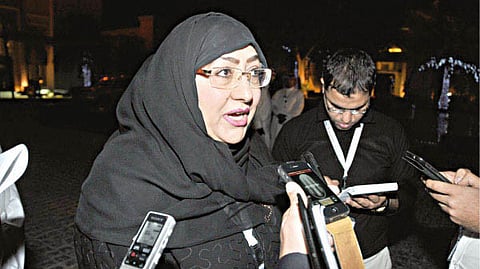Hijab becomes crunch issue in Bahrain talks
Session suspended to ease tension over remarks

Manama: Hijab has emerged as a hot issue in Bahrain’s national talks, styled as a unique chance to restore suspicions and doubts to healthy and positive relations between all the components of the nation.
The talks, launched on February 10, have brought together eight participants from Al Fateh coalition, another eight members from a coalition of opposition societies, eight independent parliamentarians and three government ministers.
Although the participants have so far held ten rounds, tension has prevailed and on Wednesday, the situation was compounded when during a heated argument, Jameel Kadhem, the spokesperson for the coalition of the opposition, reportedly criticised Lateefa Al Gaood, the first woman in the Gulf to be elected to parliament, for claiming that communists wore turbans at the height of the protests and told her that she started wearing the veil only two or three months ago.
The criticism caused deep uproar and the talks were suspended for around 40 minutes to ease the mounting tension and calm the situation.
“Such remarks are categorically rejected and should not have been made at the dialogue table,” Lateefa said following the round of talks. “He had no right to interfere in my personal life regarding wearing the veil or when I started putting on. This is between God and me. And if he chooses to comment on my hijab, what would he say about the two women who are on his side at the dialogue table,” she said, referring to opposition figures Muneera Fakro and Mariam Al Shatti who do not wear the veil.
Lateefa, an unsuccessful candidate in the 2002 parliamentary elections, but subsequently elected in 2006 and 2010, has worn the traditional Gulf black abaya that covered her head and her body. However, she started putting on a thicker headscarf after performing pilgrimage last year.
“The table is for a national dialogue on political issues, and we should not bring in other issues of a different nature,” she said.
In his comments, Jameel, a leading figure within Al Wefaq society, said that his reaction was to address a transgression.
“I was in the position of tackling wrongdoing and addressing injustice,” he said. “She is the one who started the whole thing. For the last nine rounds, she has been attacking others and accusing them of treason. Today, she waded even further by talking about turbans. We do not know what she meant by that. Turbans for us are sacred, especially when it represents the most senior religious figures. Her remarks are unacceptable,” he said.
Out of the 27 participants at the dialogue, six are women.
The four women from the bicameral parliament, two from the elected lower chamber and two from the appointed upper chamber, wear headscarves.
However, neither of the two women from the coalition of the opposition wears a headscarf.
The other two groups, Al Fateh coalition and the government, have not had any woman on their teams since the start of the talks.



